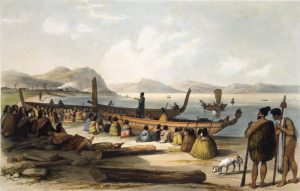For more than 200 years, history books have attributed the discovery of Antarctica in the early 1800s to the global powers at the time. The first confirmed sighting of mainland Antarctica was by a Russian expedition in 1820. One year later, an American explorer would make the first landing.
Now, after centuries of belief in this narrative, a paper published in the Journal of the Royal Society of New Zealand has highlighted that Maoris, the indigenous people of New Zealand, have a significantly longer history of travel to Earth’s southernmost continent.
“We found connection to Antarctica and its waters have been occurring since the earliest traditional voyaging, and later through participation in European-led voyaging and exploration, contemporary scientific research, fishing, and more for centuries,” said the paper’s lead author, conservation biologist Priscilla Wehi from Manaaki Whenua Landcare Research in New Zealand.
To better understand Maori contributions and perspectives, as well as those of other under-represented groups, Wehi and her colleagues scanned and catalogued appropriate literature and integrated this with oral histories to provide a record of Maori presence in Antarctic exploration.
They found that Maori and Polynesian journeys to the south were occurring more than 1,000 years before White people are recorded as having “discovered” Antarctica. The paper notes that in Polynesian narratives, Polynesian Chief Hui Te Rangiora voyaged into Antarctic waters with his crew on the vessel Te lvi O Atea in the early seventh century.
“In some narratives, Hui Te Rangiora and his crew continued south. A long way south. In so doing, they were likely the first humans to set eyes on Antarctic waters and perhaps the continent,” they wrote. “Supporting evidence lies in the name Te tai-uku-a-pia, which denotes the frozen ocean.”
Other Maori repositories of knowledge used by the researchers include carvings, which depict both voyagers and navigational and astronomical knowledge.
Sea voyaging has long been a pillar of Maori and Polynesian society. New Zealander Elsdon Best, an ethnographer who made significant contributions to the study of the Maori in the early 20th century, wrote in his 1924 book “The Maori,” that Maori navigators traversed the Pacific in the same way Western explorers might traverse a lake.
According to Te Ara, the Encyclopedia of New Zealand, sea voyaging in the Pacific Islands region began as early as 1100 BCE, when people began migrating from Southeast Asia and northern Melanesia into remote areas of the Pacific Islands region.
“Migrants voyaged east across the tropical Pacific into Remote Oceania (Melanesia south-east of the Solomon Islands, Micronesia, and Polynesia), carrying with them domesticated plants and animals, to sustain settlement in their new homes,” a Te Ara report titled “The world’s first seafarers” notes.
Around 1300 CE, Polynesian settlers made their way south to New Zealand, becoming the island’s first inhabitants. These migrants were the ancestors of New Zealand’s Maori people.
Prior to this new research, the first recorded Maori to explore Antarctica was Te Atu, a Ngāpuhi man who travelled south as part of a U.S. expedition in 1840 on board the USS Vincennes.
The recently published paper details how later Maori visitors to Antarctica demonstrated medical, construction, and scientific expertise that contributed to the aims of European expansion as part of European impetus to discover, explore, and name unexplored parts of the world.
Wehi noted in her paper that Maori narratives of connection to Antarctica are not limited to these early voyages. Rather, Maori participation in Antarctic voyaging and expedition has continued to the present day but is rarely acknowledged or highlighted. She said it’s important more research is undertaken to fill knowledge gaps and ensure inclusion of Maori in future relationships with Antarctica.
“Taking account of responsibilities to under-represented groups, and particularly Maori as Treaty partners, is important for both contemporary and future programs of Antarctic research, as well as for future exploration of New Zealand’s obligations within the Antarctic Treaty System.”

































